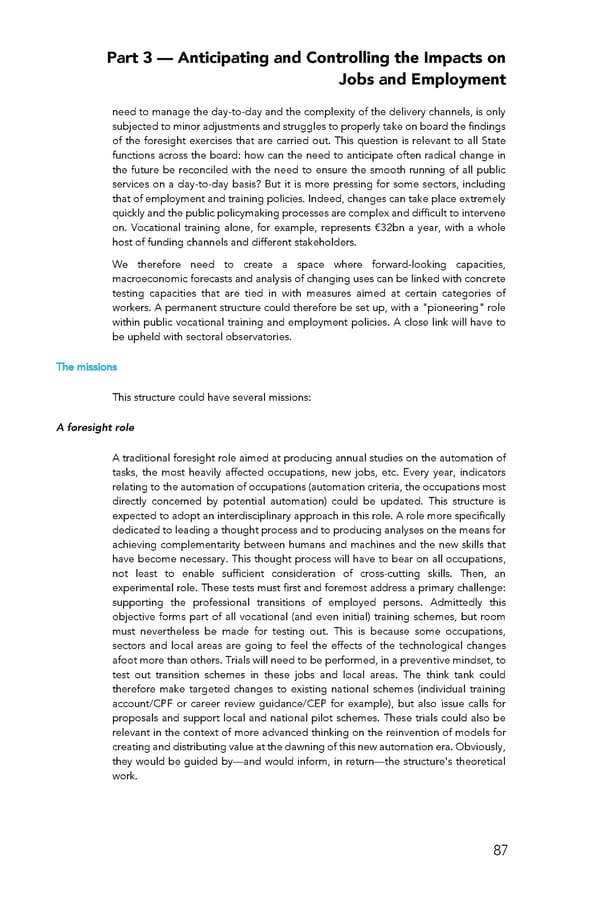Part 3 — Anticipating and Controlling the Impacts on Jobs and Employment need to manage the day-to-day and the complexity of the delivery channels, is only subjected to minor adjustments and struggles to properly take on board the findings of the foresight exercises that are carried out. This question is relevant to all State functions across the board: how can the need to anticipate often radical change in the future be reconciled with the need to ensure the smooth running of all public services on a day-to-day basis? But it is more pressing for some sectors, including that of employment and training policies. Indeed, changes can take place extremely quickly and the public policymaking processes are complex and difficult to intervene on. Vocational training alone, for example, represents €32bn a year, with a whole host of funding channels and different stakeholders. We therefore need to create a space where forward-looking capacities, macroeconomic forecasts and analysis of changing uses can be linked with concrete testing capacities that are tied in with measures aimed at certain categories of workers. A permanent structure could therefore be set up, with a "pioneering" role within public vocational training and employment policies. A close link will have to be upheld with sectoral observatories. The missions This structure could have several missions: A foresight role A traditional foresight role aimed at producing annual studies on the automation of tasks, the most heavily affected occupations, new jobs, etc. Every year, indicators relating to the automation of occupations (automation criteria, the occupations most directly concerned by potential automation) could be updated. This structure is expected to adopt an interdisciplinary approach in this role. A role more specifically dedicated to leading a thought process and to producing analyses on the means for achieving complementarity between humans and machines and the new skills that have become necessary. This thought process will have to bear on all occupations, not least to enable sufficient consideration of cross-cutting skills. Then, an experimental role. These tests must first and foremost address a primary challenge: supporting the professional transitions of employed persons. Admittedly this objective forms part of all vocational (and even initial) training schemes, but room must nevertheless be made for testing out. This is because some occupations, sectors and local areas are going to feel the effects of the technological changes afoot more than others. Trials will need to be performed, in a preventive mindset, to test out transition schemes in these jobs and local areas. The think tank could therefore make targeted changes to existing national schemes (individual training account/CPF or career review guidance/CEP for example), but also issue calls for proposals and support local and national pilot schemes. These trials could also be relevant in the context of more advanced thinking on the reinvention of models for creating and distributing value at the dawning of this new automation era. Obviously, they would be guided by—and would inform, in return—the structure's theoretical work. 87
 For a Meaningful AI - Report Page 87 Page 89
For a Meaningful AI - Report Page 87 Page 89